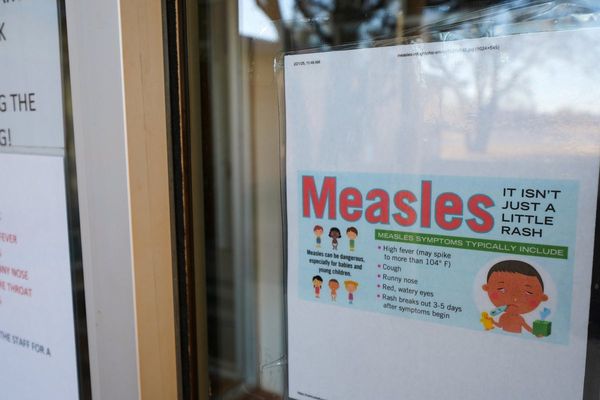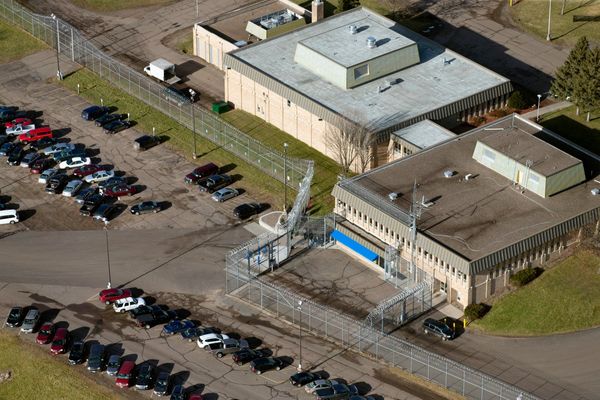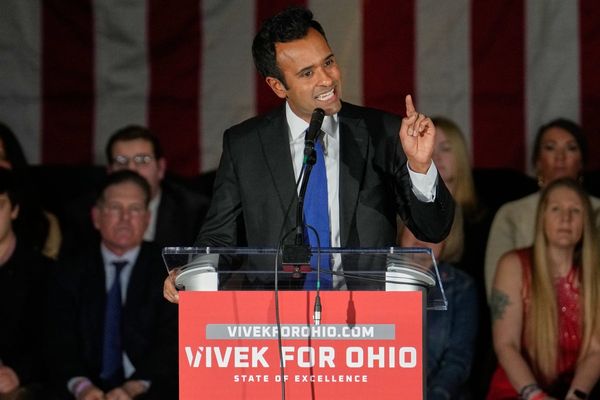
Reform UK’s former leader in Wales Nathan Gill has been jailed for 10 and a half years for taking bribes to make statements in favour of Russia when he was an MEP.
Gill, a key member of the Ukip and Brexit party groups led by Nigel Farage in the European parliament, had pleaded guilty to eight counts of bribery between 6 December 2018 and 18 July 2019.
Police believe Gill received the equivalent of at least £30,000 and could have got even more from Oleg Voloshyn, a former Ukrainian MP and alleged Russian asset. He remains under investigation but is now believed to be in Moscow.
Immediately after Gill was jailed, the defence minister Al Carns called on Farage’s party to launch a thorough investigation to guarantee that pro-Russia links were rooted out of Reform.
“Nigel Farage must urgently initiate an independent investigation into every inch of Reform UK’s party structures, membership, donors, and representatives, to give the public a cast-iron guarantee that any remaining pro-Russian links have been removed from his party,” said Carns.
“He must leave no stone unturned in this investigation.”
Investigators who were taken by surprise by Gill’s guilty plea in September say he has given no explanation of his motivation but believe he was largely driven by financial need.
The statements by Gill were designed to benefit the Kremlin’s narrative on Ukraine in the period before Russia’s full-scale invasion of its neighbour in 2022.
Gill made the statements in the European parliament and to 112 Ukraine, a pro-Russian Ukrainian television channel linked to Viktor Medvedchuk, a Ukrainian ally of Vladimir Putin, and received bribes to arrange for other MEPs to make statements.
Sentencing Gill at the Old Bailey in London, Mrs Justice Cheema-Grubb said he had betrayed the trust placed in him by the public by accepting bribes. “When you say what someone has paid you to say, you are not speaking with sincerity. If it were your genuine opinion, you would not need to be paid for saying it,” she said.
“Whether or not you believe any of what you said at the behest of Voloshyn and Medvedchuk, allowing money to corrupt your moral compass constitutes a grave betrayal of the trust vested in you by the electorate.”
Gill had “advanced narratives advantageous to Russian interests concerning Ukraine”, said the judge. “This was a period of considerable turmoil in Ukraine, and a prelude to the full-scale Russian invasion in February 2022,” she said.
A Reform UK spokesperson described Gill’s actions as reprehensible, treasonous and unforgivable. “We are glad that justice has been served and fully welcome the sentence Nathan Gill has received,” he said.
However, Reform faces potential political damage from the outcome of the sentencing at the Old Bailey, where Gill was greeted on arrival by Ukrainians and British trade unionists chanting: “What about Farage?”
Gill, 52, from Llangefni, Anglesey, had been tasked on at least eight occasions by Voloshyn, a former Ukrainian parliamentarian for a pro-Russian party, to make specific statements in return for money. Voloshyn is wanted in his native country for high treason.
WhatsApp messages between the two men were recovered after Gill was stopped at Manchester airport in September 2021. Gill said he was going to Russia to act as an observer in elections to the Duma, according to police.
Dominic Murphy, the head of the Metropolitan police counter-terrorism command, told reporters that the messages used coded language at first – with talk of “xmas presents” and “gifts” – but it was clear that Gill’s collaboration eventually became a “regular habit”, with Voloshyn making comments such as: “I’ll get you 5k.”
Investigators say they have not come across any suggestions that Gill influenced Farage, who has sought to distance himself from his one-time colleague and described him as a “bad apple” who betrayed him. Police say they have not questioned the Reform UK leader as part of the investigation.
The Crown Prosecution Service (CPS) has released selected WhatsApp messages between Voloshyn and Gill that include references to two fellow Ukip MEPs, Jonathan Arnott and David Coburn.
Both visited Ukraine with Gill on an October 2018 trip, making statements on a pro-Russian channel. Weeks later they made statements during a debate on Ukraine in the European parliament after Gill spoke.
Arnott has rejected any suggestion that he had links to Russia or was acting in its interests. Attempts have been made to contact Coburn.
The judge said Gill had enlisted MEPs representing the north-east, north-west and south-west of England to give interviews to the news channel 112 Ukraine, for which he received €5,000 (£4,400).
The sentence note submitted by the CPS stated that the MEPs who had given interviews to the channel in February 2019 were William Dartmouth, the Ukip MEP for south-west England, and Steven Woolfe, who represented north-west England. They were joined by a German MEP, Arne Gericke.
“I must make it clear that the case has not been presented on the basis that those individuals knew how you were acting, namely that you had been promised altogether €5,000 for it,” said the judge, who noted that Voloshyn had described Gill’s work as “outstanding”.
The Met has released footage of Gill being questioned by police, in which he repeatedly answers “no comment”. Police also seized €5,000 in cash and thousands of dollars from Gill’s home but say they do not know what he did with the entire amount of bribes he received.
Murphy said: “He has offered us no explanation. He was invited in for an interview, he was interviewed on tape, he answered no comment to questions, and hasn’t engaged with us with any explanation whatsoever about why and how this all happened.” Police believe Gill was primarily motivated by financial need, but note that he also had sympathy with the positions he was being bribed to take.
Murphy, who admitted he was concerned Russia was attempting to influence politics and society in the UK, said the Gill case was the first of its type that police had come across.
“What we’ve seen in this case does raise questions,” he said, noting other warnings that had come out in the past week about espionage threats from a range of countries, though Russia was a “particular challenge”.
Citing the continuing investigation, police would not say when the investigation into Gill had started, but Murphy told reporters they were “alive to” the FBI stopping Voloshyn at Dulles airport in July 2021, months before Gill was detained, and the fact that the Ukrainian’s electronic devices were searched.
Voloshyn, who fled Ukraine before the Russian invasion, is wanted by authorities in Kyiv on the charge of high treason. “It’s very unlikely that we are going to get him out of Russia unless he agrees to leave himself,” said Murphy.
In an emailed response to the Guardian after Gill’s sentencing, Voloshyn said he was “astonished” to hear the verdict. He said he found it “totally unfair”, as he said neither he nor Gill had participated in any conspiracy targeted against the legislation and security of the UK.
The Liberal Democrat leader, Ed Davey, said: “A traitor was at the very top of Reform UK, aiding and abetting a foreign adversary. Nigel Farage and his party are a danger to national security.”







